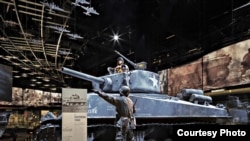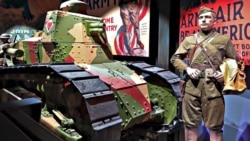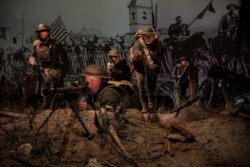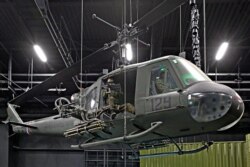For the first time, the United States Army has its own museum.
The National Museum of the United States Army opens on Veterans Day Wednesday in Fort Belvoir, Virginia.
The Army is the only U.S. military service that did not have a national museum.
Located 32 kilometers from Washington, D.C., the museum traces the history of the country’s oldest military service, which began 245 years ago in 1775.
WATCH: A look at some of the exhibits
The large five-story complex features interactive and dramatic historical exhibits, along with thousands of documents, images, artwork and artifacts, big and small. They include an iconic Sherman tank used in World War II, a helicopter from the Vietnam War, an armored personnel carrier from the Iraq War in 2003, and a saddle for horseback riding by Army special forces in the mountains of Afghanistan in 2001.
A life-size exhibit illustrates American forces storming the beaches of Normandy on D-Day during World War II.
Helmets, swords and medals are also featured, and even a watch that was found in a damaged section of the Pentagon after the 9/11 attacks.
Although many exhibits focus on wartime activities, the museum also highlights peacekeeping operations and humanitarian missions around the world, Tammy Call, director of the museum, told VOA.
A major exhibit called Soldier Stories tells “the individual soldier story” as part of the comprehensive history, explained Call, a civilian who is an Army veteran, “and so it allows us to get very personal and reflective,” she added.
Jack Querfeld, director of internal affairs at the American Legion headquarters in Indianapolis, Indiana, was impressed that the various battles shown in the exhibits “put a human face on it, instead of just saying we fought here.”
“The National Army Museum will be a place for members of the total Army family to gather and share their stories,” said Ryan D. McCarthy, secretary of the Army.
That means a lot to B.J. Lawrence, executive director for the Washington, D.C., office of the Veterans of Foreign Wars. Lawrence was an Army sergeant in South Korea in the early 1980s.
He said the museum is “phenomenal,” and as he toured the complex, he found “the exhibits that pertain to the Korean War had an especially touching effect on me.”
“I continue to advocate to bring the soldiers home that were missing in action,” Lawrence said.
Querfeld said, “I think the museum will help children now and those from generations to come understand what their military forefathers experienced.”
The museum “tells us how important military service is to our nation,” Lawrence said. “And it helps to explain and put into perspective why the American people enjoy the freedoms they do today.”










